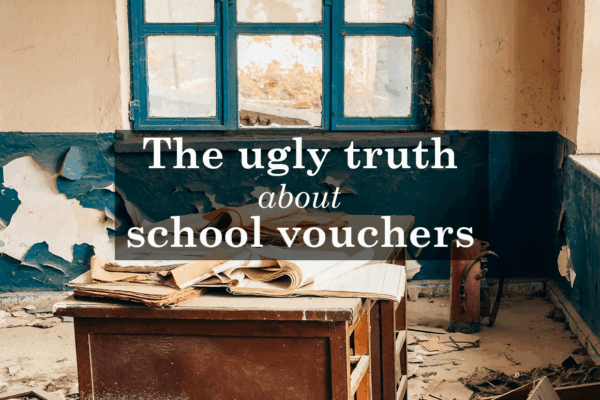Top South Carolina lawmakers intend to pass a private school voucher law in 2025. This is a terrible idea.
A voucher is a tool for taking public school funding and sending it to private schools. A family that chooses to use a voucher will often have some, but not all, of the cost of tuition covered by the state. After years of abysmal academic results in other states, some politicians have tried rebranding vouchers with new names like “Education Savings Accounts.” In South Carolina’s case, they chose the name Education Scholarship Trust Fund Program (Senate Bill 62).
I’m a South Carolina public school parent who worked for years as an award-winning education reporter. Let me share what the research says about vouchers — because you aren’t going to hear it from pro-voucher politicians this year.
Vouchers cause learning loss.
You probably heard about the problem of learning loss during the peak of the COVID-19 pandemic. Students fell behind grade-level expectations in reading and math, and teachers are still working to catch them up to speed.
In terms of learning loss in mathematics, the effect of vouchers has been worse in some states than the effect of COVID-19, according to the National Coalition for Public Education. Studies of long-running voucher programs in Louisiana, Indiana, Ohio, and Washington D.C. show that students who used vouchers to leave public schools for private schools performed worse than their peers who stayed in public schools.
There are a few theories about why this happens. Many voucher-recipient schools are what education researcher Josh Cowen has called “sub-prime providers,” which are propped up by voucher funding and often close within a few years after opening. One analysis of D.C. voucher-recipient religious schools suggested that they produced worsening results in part because students “received less instruction in reading and math.”
Vouchers are risky for kids with disabilities.
In a 2011 report, the ACLU of Wisconsin found that voucher-recipient schools in Milwaukee were “failing to provide children with disabilities their right to equal access to an education.” Milwaukee Public Schools remained the only option for students with disabilities, as the state had exempted private schools from anti-discrimination laws. A local journalist found that similar problems persisted well into 2023.
The ACLU of Wisconsin found that the result of Milwaukee’s voucher experiment was the creation of a “dual system of education in the city” — where students without disabilities had the choice of using a private school voucher, while students with disabilities could really only attend Milwaukee Public Schools.
The problem is not limited to Wisconsin, the birthplace of the so-called “school choice” movement. A 2018 nationwide analysis in the American University Law Review found that vouchers were “effectively no real choice at all” for families of students with disabilities. By denying Individualized Education Plans and requiring families to sign away their rights under the federal Individuals with Disabilities Education Act (IDEA), researchers found that vouchers were putting the education of students with disabilities back decades.
Vouchers fund discrimination.
The now-defunct voucher law that South Carolina lawmakers passed in 2023 states that voucher-recipient schools may not discriminate “on the basis of race, color, or national origin.” Notice any categories missing from that list? The new voucher bill being debated in 2025, S. 62, would delete even the threadbare anti-discrimination protections from the 2023 law.
Vouchers send public money to schools that forbid LGBTQ people from enrolling as students or working as teachers. To quote the handbook from one school that was previously approved to accept voucher payments in South Carolina, “We will not accept or condone any student who is in a same-sex relationship.” Other schools approved for vouchers in South Carolina have a policy of expelling students who become pregnant.
Vouchers also fund schools that provide sectarian religious instruction and require adherence to a religious creed. At least 70% of South Carolina private schools are Christian, meaning that in many counties, the only “choice” of private school is a Christian one. If you are not a Christian, or not a member of the denomination running the school, you're out of luck.
Vouchers are a budgetary disaster.
In 2022, Arizona passed a universal school voucher program, available to all families regardless of income. By 2024, the state faced a $1.4 billion budget shortfall, largely due to new voucher spending for families who never sent their children to public schools in the first place.
If South Carolina creates universal school vouchers, it will blow a hole in its own budget. According to one estimate by the Revenue and Fiscal Affairs Office in 2021, universal vouchers would cost the state $2.9 billion per year. In a state that already underfunds its own mandated expenses for public schools by a half-billion dollars per year, this could be a death blow to public education — particularly in high-poverty and rural counties, where decades of chronic underfunding have already stranded students without access to even a “minimally adequate” education.
Vouchers mostly help wealthier families.
In states with universal school vouchers, the majority of families using vouchers were already in private schools to begin with. In Florida in 2023, 69% of applicants to a newly expanded voucher program were already enrolled in private schools. In Arizona, that figure was 75%.
Vouchers take money from the poor and give it to the rich. That might be part of the reason why vouchers are broadly unpopular. Across the political spectrum in every state that has put vouchers up for a public referendum, voters have rejected them. Most recently, in November 2024, voters in Colorado, Kentucky, and Nebraska rejected ballot measures that would have allowed public money to go to private schools.
Vouchers violate the South Carolina Constitution.
The South Carolina Constitution is not subtle about its prohibition on public aid to private schools. Article XI, Section 4 states:
No money shall be paid from public funds nor shall the credit of the State or any of its political subdivisions be used for the direct benefit of any religious or other private educational institution.
That’s why the South Carolina Supreme Court shut down a previous school voucher program in September 2024. Today in the Senate Education Subcommittee, lawmakers will try to ram through a slightly modified voucher bill that takes revenue away from the South Carolina Education Lottery, which currently funds college scholarships. We’ll see if that constitutional workaround holds up in court.
Failing that, some lawmakers have indicated they are also willing to amend the state constitution. A bill pre-filed for this legislative session, S. 153, would simply repeal Article XI, Section 4.
Interested in hearing more about the out-of-state dark money campaign to push private school vouchers in South Carolina? Subscribe to our free podcast, While I Breathe, available wherever you listen. Episode 12 will feature an interview with Josh Cowen, author of The Privateers: How Billionaires Created a Culture War and Sold School Vouchers.
Photo by Alper Tufan.


